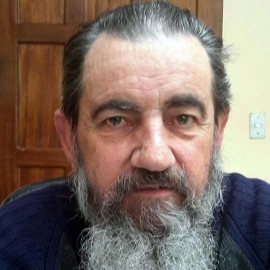Fr Panteghini is now sixty-nine years old and the story is floating in his memory. He is the master of an enriching testimony, full of crosses and cultural meetings. "Every people has its own culture, but when someone teaches something that goes a little out of their own culture, then one learns a lot from them" he says.
All the experiences he shared with members of the Shuar community have convinced him that the Shuar are very hospitable. They welcomed him and he came to realise that the important thing in that environment was to respect the culture, particularly women.
An unknown stranger cannot enter a house in the absence of the owner but must wait outside. The Shuar community uses oval-shaped houses with two doors, one through which the women enter and one through only the man of the house may enter.
"Like every people, the Shuar have their own way of justice, you cannot come to judge." He learned to hunt but said that "I was already a good hunter, so I was accepted very quickly."
Fr Panteghini saw how they did the "tsanta" - the ritual shrinking of human heads. Normally they did it in private. He remembers a "tsanta" which they presented to him – it was the head of one of the most important and respected members of the Shuar.
The Shuar are a people with their own beliefs. For purification they use the water falls. The earth is the mother who gives life, to be respected always. Respect for nature is like their religion. They practise traditional medicine and part of their knowledge is the "coumarin", that is, the healing from a snake bite.
At the beginning of his time they learned Spanish and the lessons offered to them in the missions were also in Spanish. They were then "transmitted orally to children in cultural traditions and ritual songs."
Source: El Mercurio de Ecuador


